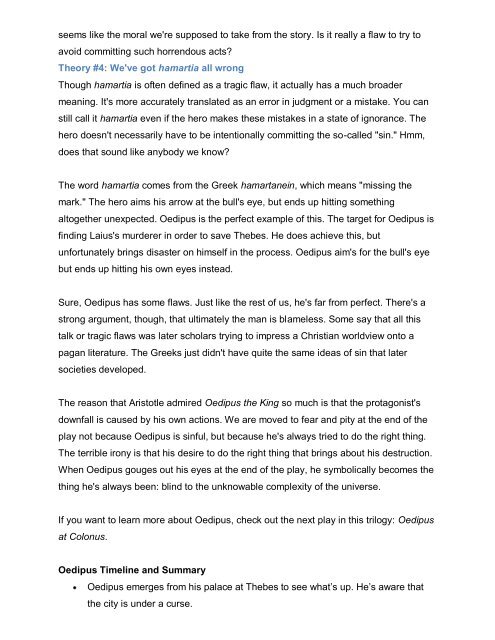Oedipus Trilogy Resources : Primarily Rex and Colonus
Oedipus Trilogy Resources : Primarily Rex and Colonus
Oedipus Trilogy Resources : Primarily Rex and Colonus
You also want an ePaper? Increase the reach of your titles
YUMPU automatically turns print PDFs into web optimized ePapers that Google loves.
seems like the moral we're supposed to take from the story. Is it really a flaw to try to<br />
avoid committing such horrendous acts?<br />
Theory #4: We've got hamartia all wrong<br />
Though hamartia is often defined as a tragic flaw, it actually has a much broader<br />
meaning. It's more accurately translated as an error in judgment or a mistake. You can<br />
still call it hamartia even if the hero makes these mistakes in a state of ignorance. The<br />
hero doesn't necessarily have to be intentionally committing the so-called "sin." Hmm,<br />
does that sound like anybody we know?<br />
The word hamartia comes from the Greek hamartanein, which means "missing the<br />
mark." The hero aims his arrow at the bull's eye, but ends up hitting something<br />
altogether unexpected. <strong>Oedipus</strong> is the perfect example of this. The target for <strong>Oedipus</strong> is<br />
finding Laius's murderer in order to save Thebes. He does achieve this, but<br />
unfortunately brings disaster on himself in the process. <strong>Oedipus</strong> aim's for the bull's eye<br />
but ends up hitting his own eyes instead.<br />
Sure, <strong>Oedipus</strong> has some flaws. Just like the rest of us, he's far from perfect. There's a<br />
strong argument, though, that ultimately the man is blameless. Some say that all this<br />
talk or tragic flaws was later scholars trying to impress a Christian worldview onto a<br />
pagan literature. The Greeks just didn't have quite the same ideas of sin that later<br />
societies developed.<br />
The reason that Aristotle admired <strong>Oedipus</strong> the King so much is that the protagonist's<br />
downfall is caused by his own actions. We are moved to fear <strong>and</strong> pity at the end of the<br />
play not because <strong>Oedipus</strong> is sinful, but because he's always tried to do the right thing.<br />
The terrible irony is that his desire to do the right thing that brings about his destruction.<br />
When <strong>Oedipus</strong> gouges out his eyes at the end of the play, he symbolically becomes the<br />
thing he's always been: blind to the unknowable complexity of the universe.<br />
If you want to learn more about <strong>Oedipus</strong>, check out the next play in this trilogy: <strong>Oedipus</strong><br />
at <strong>Colonus</strong>.<br />
<strong>Oedipus</strong> Timeline <strong>and</strong> Summary<br />
<strong>Oedipus</strong> emerges from his palace at Thebes to see what’s up. He’s aware that<br />
the city is under a curse.


